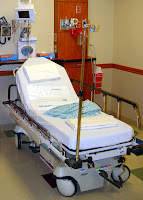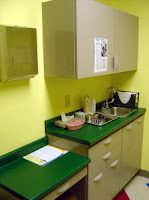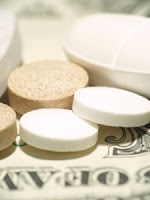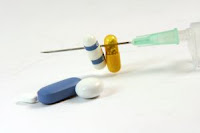Oh, for crying out loud! I KNOW I need to be my own healthcare advocate, so shame on me for letting this happen. Live and learn ...
In my last post I described my recent flurry of doctor visits - four doctors in one week - and each made changes to my medications. These doctors know about each other and sometimes share my lab results, but that's where the

collaboration ends. Fair enough: Most healthcare services are delivered this way and it's up to patients to play ringmaster.
Alas, I forgot this important lesson two days ago when I began taking the four new pills, vitamin E and two new types of insulin my doctors prescribed (these were added to the five pills and multivitamin I already take). Day one - bad headache and fatigue, which I chalked up to being overwhelmed by the changes, and little appetite. Day two - headache continues, little appetite, don't feel great but doing OK until about 5 pm, when I threw up. Hmmm. Threw up again at 10 and four more times last night. Now I'm worried about taking insulin when I haven't eaten much, especially since what I ate didn't stay down anyway.
I've been a bad ringmaster. All these med changes are wreaking havoc on my body (starting five new meds at one time wasn't such a great idea, I'm thinking). It's an experiment without any controls.

My primary care physician would have been the most likely person to view this from a big picture perspective, but I saw her a week ago and most of the changes occurred after that visit. Two of the medications have side effects that can include "gastric distress," and I sincerely wish I had started them separately. Ah, such is hindsight.
This morning I woke up and, good news! no headache. I ate a scrambled egg and kept it down. But before putting a pill in my mouth I called my transplant center to speak to the person on call and, as luck would have it, my coordinator answered. She had me discontinue one of the pills (a gastric distress-causing med) and called in a prescription for nausea. Even without the nausea med, the vomiting has stopped. However, I now have diarrhea. Oh, fabulous.
Tonight I'm stopping the other gastric distress-causing pill and will see what happens. Tomorrow is my body's day to reach equilibrium; Monday I can start a smaller dose of one of the meds and, in a controlled manner, see if I can tolerate it and later in the week, I'll try the second one.
Note to self: I must pay attention. I'm the ringmaster; the lion tamer, if you will. It's up to me to bring order to the chaos.
Top photo by Claudia Meyer
Bottom photo courtesy of U.S. Library of Congress
* Liver diseases such as hepatitis C, non-alcoholic fatty liver disease (NAFLD) and liver cancer are on the rise.
























